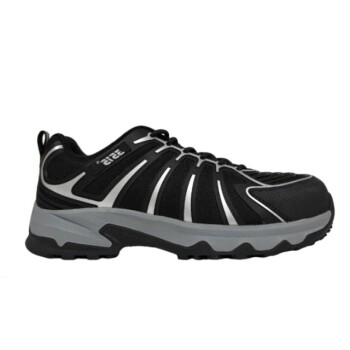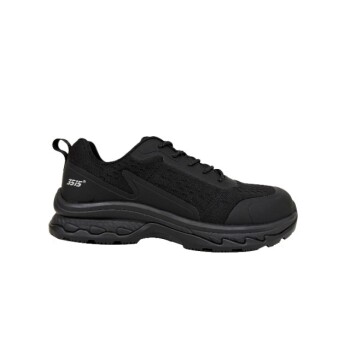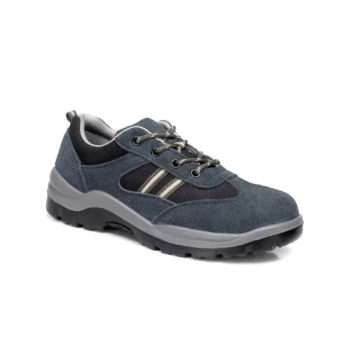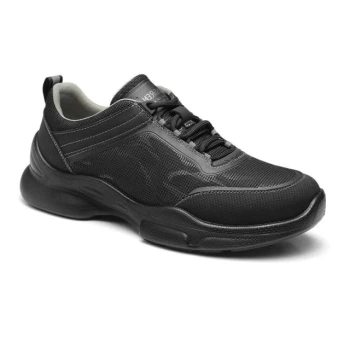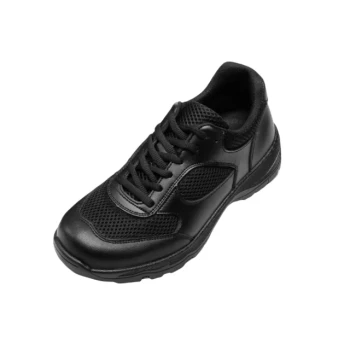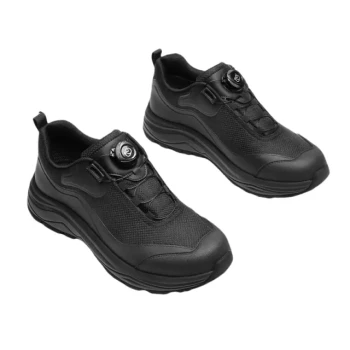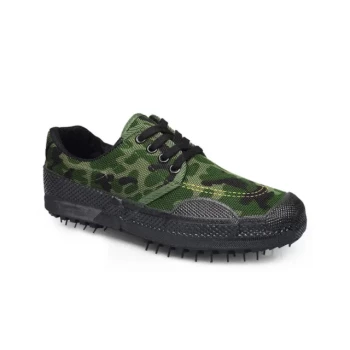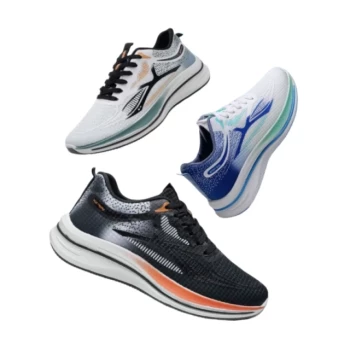Wearing the correct shoe size is crucial because it acts as the first line of defense against a cascade of painful foot conditions. An improper fit, whether too tight or too loose, creates constant friction and unnatural pressure, leading to immediate issues like blisters and calluses while paving the way for more severe, long-term structural problems.
The importance of proper shoe size extends far beyond immediate comfort. It's a foundational health choice that protects against acute injuries, prevents chronic foot deformities, and even influences your risk for systemic conditions like diabetes and arthritis.
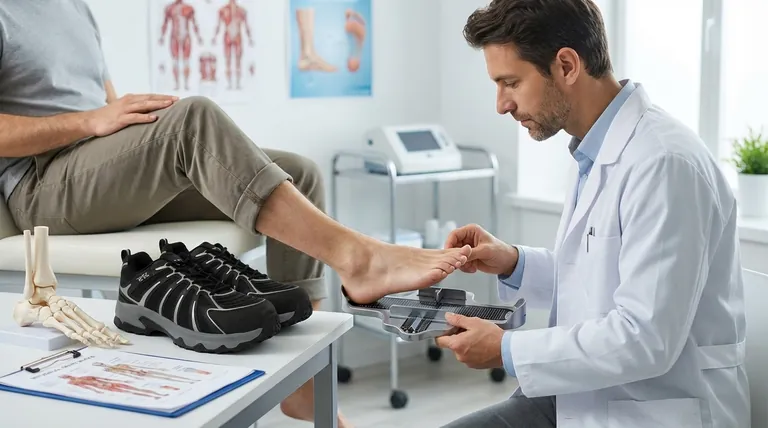
The Immediate Consequences of an Improper Fit
When your shoes don't fit correctly, your feet are the first to suffer. The negative effects are often noticeable within hours or days of wear.
Friction and Pressure Points
Shoes that are too tight constrict the foot, while shoes that are too loose allow the foot to slide. Both scenarios cause excessive rubbing against the shoe's interior.
This constant friction is the primary cause of painful blisters, calluses, and corns, which are the body's defensive responses to repeated stress on the skin.
Compromised Foot Mechanics
A poor fit forces your foot into an unnatural position, altering your gait and the distribution of weight. This can over-stress ligaments and tendons.
Conditions like plantar fasciitis (inflammation of the tissue on the bottom of the foot) and tendonitis are common outcomes of shoes that lack proper support or sizing.
Increased Moisture and Risk
Ill-fitting shoes can cause your feet to perspire more. This excess moisture, trapped inside the shoe, creates a breeding ground for bacteria and fungi, increasing the risk of infections.
The Long-Term Impact on Your Entire Body
The effects of poorly sized shoes ripple upward from your feet, impacting your entire musculoskeletal system and even your overall health over time.
The Link to Chronic Disease
Properly fitting shoes are a critical tool in managing and preventing chronic health issues. Good footwear improves circulation, which is vital for those with heart disease or diabetes.
Supportive shoes also ease joint pressure on the knees, hips, and back, which can alleviate symptoms associated with arthritis.
Structural and Postural Problems
Your feet are the foundation of your body. When they are not properly supported, it creates a chain reaction that can lead to misalignment and pain in your ankles, knees, and back.
Over years, this can contribute to poor posture and chronic pain throughout your body.
Injury Prevention
The right shoe does more than just fit; it provides stability. Key features like adequate support and traction are essential for preventing acute injuries.
This significantly reduces the risk of slips and falls that can lead to sprained ankles or even broken bones.
Understanding the Trade-offs and Common Pitfalls
Choosing the right shoe involves more than matching a number to your foot. It requires understanding how a shoe should function throughout the day.
The Myth of "Breaking In"
A common mistake is buying uncomfortable shoes with the expectation they will "break in." While some materials may soften slightly, a shoe that is fundamentally the wrong size or shape will not become comfortable and will cause damage in the process.
Accommodating Natural Foot Swelling
Feet naturally swell over the course of the day due to activity and gravity. A shoe that fits perfectly in the morning may feel painfully tight by the afternoon.
It is always advisable to shop for shoes later in the day to find a size that accommodates this natural expansion.
The Importance of a Spacious Toe Box
Many foot problems stem from a toe box that is too narrow, even if the shoe's length is correct.
A spacious toe box allows your toes to splay naturally, which is crucial for balance and preventing conditions like bunions, corns, and hammertoes.
Making the Right Choice for Your Foot Health
Your footwear needs depend on your daily activities and underlying health goals. Use these principles to guide your selection.
- If your primary focus is preventing immediate pain: Prioritize a shoe with a cushioned insole and a spacious toe box to eliminate friction and pressure points.
- If your primary focus is long-term joint health: Look for footwear with excellent arch support and a firm, supportive foundation to ensure proper body alignment.
- If your primary focus is managing a chronic condition like diabetes: Choose shoes that enhance circulation, have a seamless interior, and provide ample room to avoid any rubbing or constriction.
Investing in properly sized footwear is a direct investment in your mobility and long-term well-being.
Summary Table:
| Footwear Fit Issue | Immediate Consequence | Long-Term Risk |
|---|---|---|
| Too Tight | Blisters, Calluses, Corns | Bunions, Hammertoes, Nerve Damage |
| Too Loose | Sliding, Friction, Instability | Gait Problems, Ankle/Knee Pain |
| Poor Support | Plantar Fasciitis, Tendonitis | Joint Misalignment, Chronic Back Pain |
Invest in Proper Footwear for Your Customers' Health and Your Business Success
As a large-scale manufacturer, 3515 produces a comprehensive range of footwear for distributors, brand owners, and bulk clients. Our production capabilities encompass all types of shoes and boots, designed with the precise sizing, support, and spacious toe boxes detailed in this article. We help you provide footwear that protects end-users from pain and chronic conditions, enhancing their mobility and building trust in your brand.
Let's collaborate to create footwear that supports health and drives sales. Contact our team today to discuss your manufacturing needs and receive a custom quote.
Visual Guide
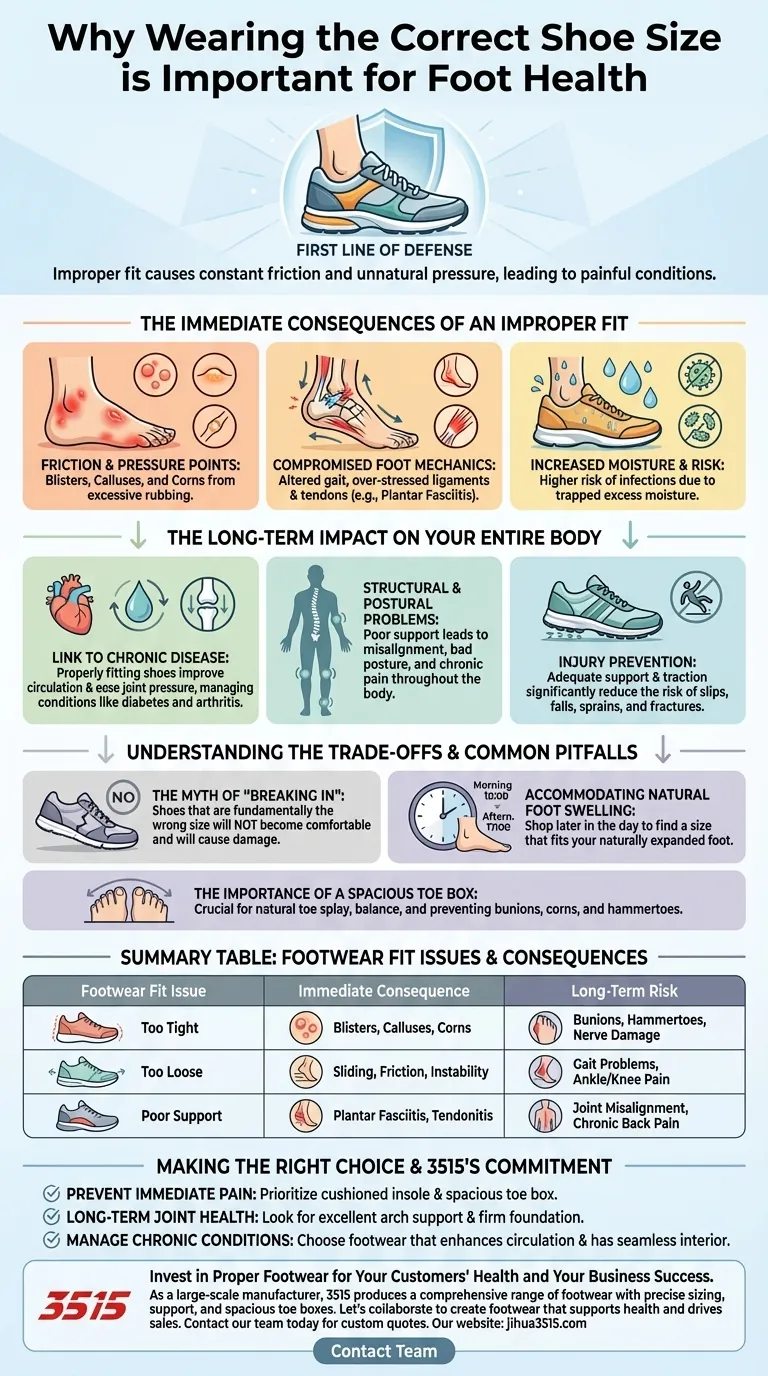
Related Products
- Premium KPU Athletic Safety Shoes for Wholesale
- Premium Lightweight Safety Shoes for Wholesale & Bulk Orders
- Custom Safety Shoe Manufacturer for Wholesale & OEM Brands
- Wholesale Leather Safety Boots with Customizable Protective Toe
- Wholesale Durable Breathable Safety Boots Custom OEM Manufacturer
People Also Ask
- Why does the material performance of professional slip-resistant shoes offer superior safety? Hardware vs. Behavior
- Why are industrial-grade safety shoes mandatory in metallurgical workshops? Essential Protection for Extreme Environments
- Why is compliance with safety standards such as PN EN ISO 20347:2012 critical? Ensure Certified Workplace Protection
- What is the purpose of requiring subjects to wear anti-slip socks and tight-fitting sportswear? Optimize Sensor Data
- Why is it mandatory to wear safety shoes with steel toe protection during metal loading? Prevent Crushing Injuries
